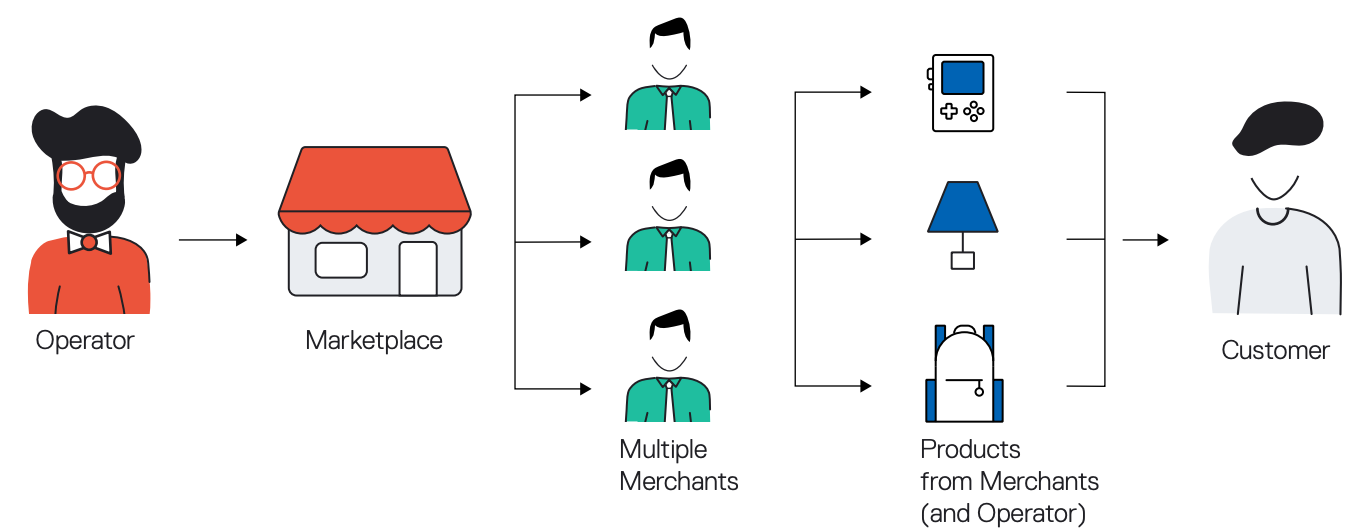Everything You Need To Know About Starting a Marketplace
A Comprehensive Marketplace Walk-through of Business Models, Benefits, and Concrete Solutions with Spryker.Would you like to read the Guide offline?
Download as a PDFWhat is a Marketplace?
Traditionally, marketplaces are a space where sellers and buyers converge to offer and purchase products.
When Amazon first launched its online marketplace in November 2000, the idea of third-party vendors congregating on a website to present products to consumers was still very much a novelty. These days, marketplace sales account for 62% of the global online retail sales. In 2020 alone, about $2.67 trillion was spent on the world’s top 100 marketplaces.
As global marketplace giants such as Alibaba, Amazon, eBay, and Etsy make continued efforts to increase their market share, the relevance of online marketplaces will become even more apparent to potential vendors and businesses alike.
Marketplaces offer immense growth potential for businesses within B2C and B2B industries. By adopting a marketplace model, companies have the opportunity to scale at a much quicker pace while reducing risk. Gartner predicts that by 2023, 15% of medium-to high-GMV digital commerce organizations will have deployed their marketplaces, thereby creating an entirely new digital ecosystem.
For organizations with an existing traditional e-commerce platform, a digital marketplace could be the next step in accelerating customer acquisition and increasing revenue.
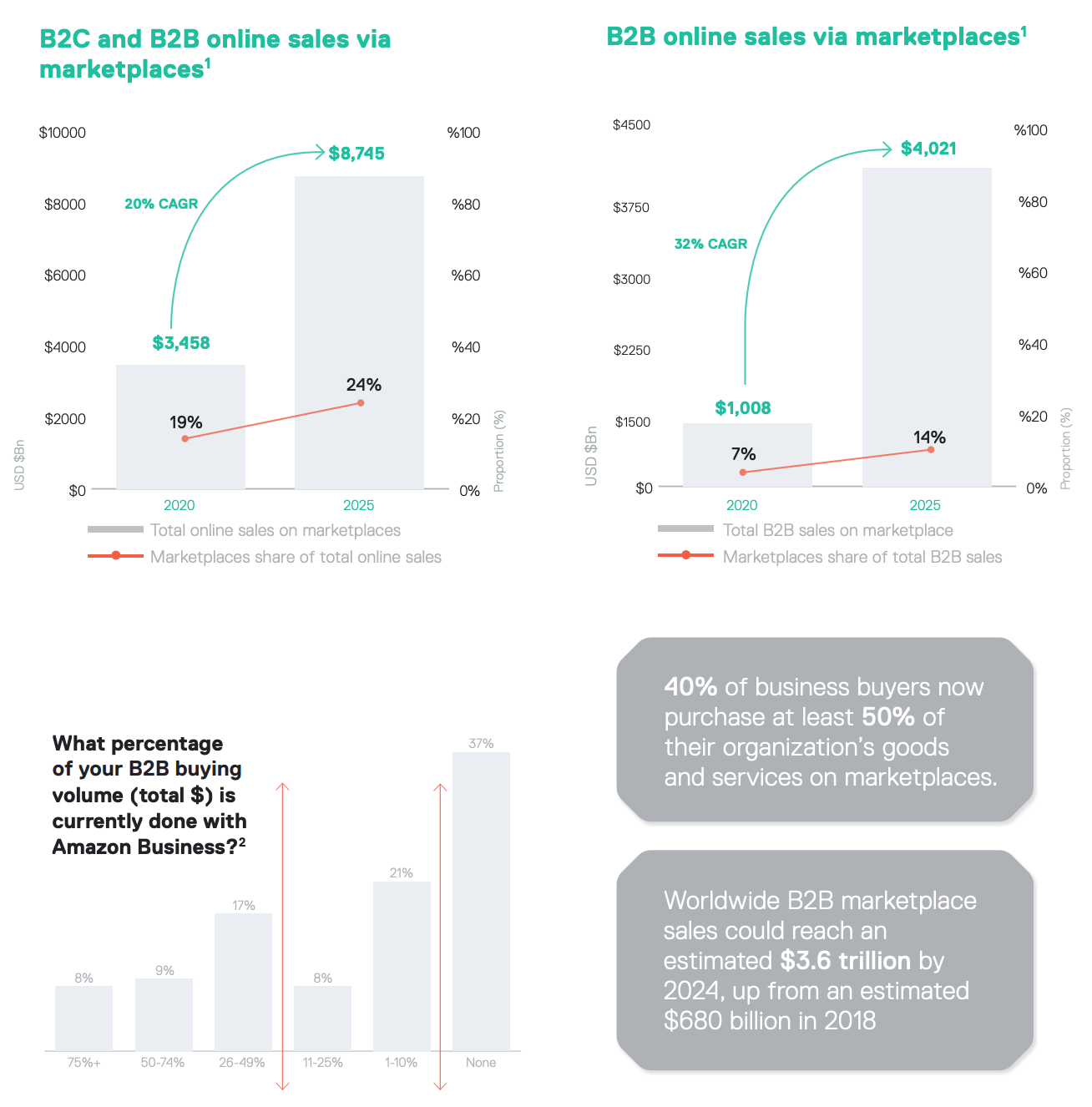
Although marketplace giants such as Amazon currently dominate the B2C Marketplace scene, there is still immense growth potential for marketplaces, especially those looking to play within the B2B sector. Businesses within industries such as manufacturing, construction, MedTech, and several others within the B2B field still have so many opportunities to drive revenue with the marketplace model. In addition, creating a niche online marketplace can help a business rise above the competition. Niche marketplaces solve specific customer needs, making it easier for businesses to gain recognition from customers at a much quicker rate. Focusing on a particular market segment will instantly make your platform the go-to place for customers searching for such products or services.
How does a Marketplace Work?
Modern-day marketplaces typically function in two distinct ways. On one hand, is the 3rd party Marketplace model and on the other is the 1st and 3rd party Marketplace model. Businesses choosing to run a 3rd party marketplace assume the role of the marketplace operator and then invite third-party merchants to sell goods on their platform. However, in a 1st and 3rd party marketplace, the business or platform owner plays both roles. The marketplace operator manages the activities of 3rd party merchants and also offers its branded products directly to customers.
In the last few years, B2B organizations within traditional sectors have seen their counterparts tilt in favor of digitization. The race towards digital transformation has created ample growth opportunities for marketplaces, particularly enterprise marketplaces. According to Gartner, by 2023, at least 70% of the enterprise marketplaces launched will serve B2B transactions.
As brands seek new ways to extend their products to a larger community, getting more stakeholders on board will be a task that they will have to accomplish. These stakeholders or merchants will require an efficient platform to conduct their activities and reach new customers. To achieve this, the marketplace operator and merchant must agree on roles from the project's inception.
The Marketplace Operator
Every online marketplace has a marketplace operator. A marketplace operator is an individual or business entity that owns or runs a marketplace. Depending on the marketplace model employed, the marketplace operator will have the ability to manage the store and offer its catalog of products directly to customers. The operator is primarily responsible for organizing and regulating trading activities that take place on the platform. A few other responsibilities include:
- Designing, setting up and integrating additional technological software to the platform.
- Handling all legal and business-related obligations
- Inviting merchants to the platform and activating or deactivating merchant-accounts
- Approving or disapproving products or offers created by merchants
- Adding their products to the platform and selling products that are exclusive to them (on Enterprise Marketplaces)
- Updating the business product detail page, stocking the inventory, and fulfilling orders (on Enterprise Marketplaces)
- Viewing all orders and sales activity in the Back Office
- Overseeing financial transactions
- Collecting the appropriate subscription fees or commission
- Providing customer service and resolving issues with merchants
The Merchants
A pure or enterprise marketplace cannot function adequately without merchants. A merchant is any individual or entity that sells products or presents offers on an online marketplace. The merchant automatically earns the right to add products to their portal after receiving approval from the operator. In this portal, merchants can create product pages where customers can see product descriptions, images, ratings, and other relevant product information. A few of their other responsibilities include:
- Creating and editing merchant profiles that appear on the storefront
- Adding the appropriate contact and legal information on profile pages
- Adding multiple products and building product catalogs
- Setting up offers and adding pricing options
- Sourcing products and managing internal inventory
- Managing and fulfilling customer orders in the merchant portal
How to Onboard Merchants in 7 Steps
With merchants as stakeholders in your new business model, it is crucial to provide adequate training on your business processes, policies, and guidelines that could affect you (the marketplace operator) and the merchant. Checks and balances need to be put in place to protect the interest of customers. Merchants are required to comply with laws and selling procedures that you have implemented to mitigate risk and increase overall efficiency. The onboarding process is the first step in building an effective merchant-operator relationship. Nurturing your relationship with merchants will aid in strengthening your business in the long run.
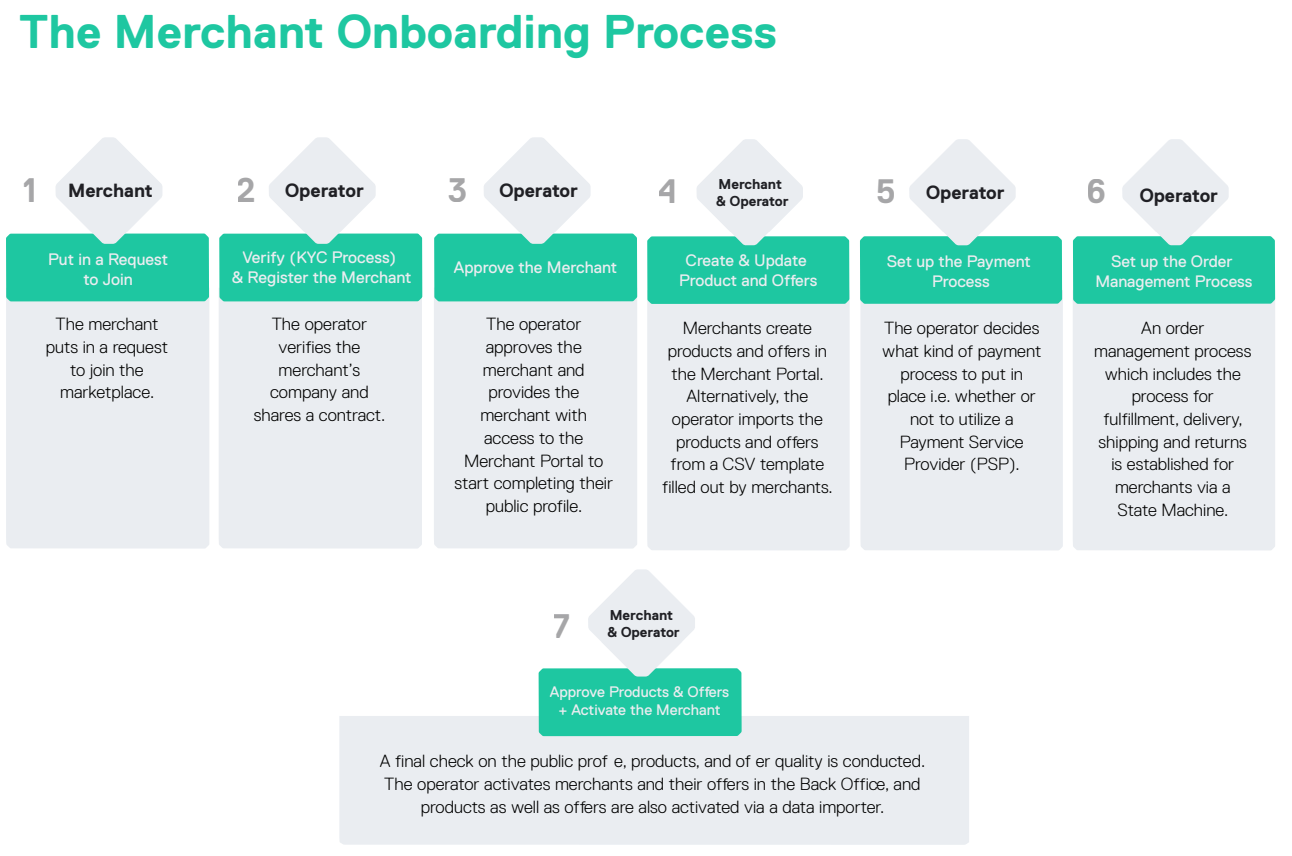
The Benefits of Starting a Marketplace
In today's digitally-led environment, marketplaces provide immense benefits for independent sellers, corporations, and customers alike. One advantage of the marketplace model is that it presents a much larger product offering to customers. In a lot of ways, this creates a win-win situation for all stakeholders involved. A broad product portfolio and higher inventory levels equate to easier discovery on the customer side and this, in turn, leads to sales. Some B2B and B2C businesses are often bothered by the competitive nature of enterprise marketplaces. However, they fail to consider the benefits associated with such platforms.
Scale your business effortlessly:
It's no secret that with a marketplace, businesses can scale easily. Any type of e-commerce project can be a huge undertaking, especially for companies new to the digital ecosystem. By investing in a marketplace, you can reduce the risk of spending millions of dollars sourcing large amounts of inventory and managing the entire distribution process. Having merchants onboard can enrich your product portfolio and help you grow your customer base.Increase your profit margin:
Implementing a marketplace model introduces new revenue streams to your business. Adding merchants to your existing platform requires fewer resources than stocking and managing your products would take. Redistributing the financial risks while receiving commissions on successful sales automatically increases your profit marginDifferentiate your offerings:
Growing the number of merchants on your platform gives you the unique opportunity to diversify your product offerings, and introduce and test new, niche products without any risk or stock commitments. With a marketplace, you can grow and expand your offerings, while seizing the opportunity to become the central focal point for your customers by meeting every product and service need.SEO improvements and increased traffic:
The listings of new merchants and their portfolios bring additional traffic to your marketplace. A better search engine ranking will ensure a constant stream of customers, which will lead to more sales.Include merchants in your growth strategy:
With the marketplace model, you can grow your business in areas you are yet to branch out to. Relying on the expertise of your merchants and leaving the majority of purchases to them, could give you room to focus strategically on products with high margins, up-sales, and services.Getting ownership of the entire platform:
Merchants take over a variety of operational tasks thus freeing up resources for the marketplace operator. However, the operator stays in control of merchant activities within the marketplace. Businesses operating a marketplace can maintain full ownership of the platform. This includes regulating products and price levels offered by the merchants.Foster customer loyalty:
Creating a wellrounded and optimized product and service portfolio unifies your customers’ needs and turns them into returning customers. A marketplace could help you foster customer loyalty by being the primary shopping platform with an answer to every demand, thereby keeping your customers from switching to a competitor. 24/7
operation:
With a marketplace, you no longer have to worry about fulfilling orders and offering product availability around the clock on your own. Share this responsibility with local merchants and open your marketplace beyond your borders and time zones.
Merchants can increase their customer base:
Merchants have immediate access to new and existing customers as soon as they join the marketplace. There is no need for extensive marketing activities as new audiences can be reached the moment the merchant completes their onboarding process. This makes expansion to other countries possible with very little effort, as marketplaces often work internationally.Resources are used for operational excellence:
The marketplace typically does the heavy lifting to expand the customer base. As a result, merchants are given room to focus on achieving optimal performance and gaining a high rank within the marketplace.Start from a marketplace and grow from there:
The thought of running an online store independently can sometimes be daunting for new merchants. Starting a business on a marketplace alongside other merchants could present a growth opportunity for merchants. They wouldn't have to worry about building and running an entire platform or making significant investments such as hosting, designing, or marketing a new platform.purchase new merchants.Merchants benefit from trusted marketplaces:
The marketing, branding, and trust-building of the marketplace will help your merchants to convince new customers to try their products and services. If the marketplace is credible and has a good reputation, customers are more willing to purchase new merchants.Easily test out products and business ideas:
Merchants can use the marketplace as an environment to test new products or business ideas. The variety of customers on a marketplace could help them discover which target group responds to their products and how much they are willing to spend.The marketplace as a marketing opportunity:
Merchants can use their presence on the marketplace as an additional marketing opportunity. By customizing and branding their profile in the marketplace, they can gain even more visibility and also strengthen their digital presence.Increased convenience for customers:
Your customers can conveniently shop on your online marketplace and have a greater variety of products and services at their disposal. International customers have the chance to buy products from local merchants thereby lessening the delivery time.Saving costs by using price transparency:
Customers have the chance to compare prices and services by different merchants within the marketplace and find the best service for the cheapest available price. They can purchase their desired items while benefiting from the price transparency that a marketplace offers.Benefiting from highly stocked products:
Marketplaces have numerous merchants that all carry products and can make offers on existing products if they have them in stock. This means that stock levels will remain relatively high, and customers wouldn't experience difficulty sourcing products - as one product could be stocked by several different merchants.Marketplaces are a trusted platform:
Once vetted by the customer, a marketplace can be considered a trusted platform that provides a sense of safety. In case of conflicts, marketplace operators are available to guarantee customer safety, whether it's with their payment information or ensuring the order fulfillment process runs smoothly. This means that customers have continuous access to a variety of products without needing to change shops and vetting each new shop on their own.All About the Spryker Marketplace Suite
While building the Marketplace Suite, Spryker developers have ensured a consistent user experience for the end Customer, third-party merchant, and marketplace operator. A single platform and infrastructure avoid complex integration and licensing issues that often arise when a Marketplace is built on different e-commerce platforms. It also means that our existing customers can effortlessly upgrade and extend their Spryker shop with Marketplace functionalities.
Extensive new capabilities ensure that all the needs of running a Marketplace are met, like additional back-office functionalities, a brand new merchant portal, or well-arranged shop integrations.
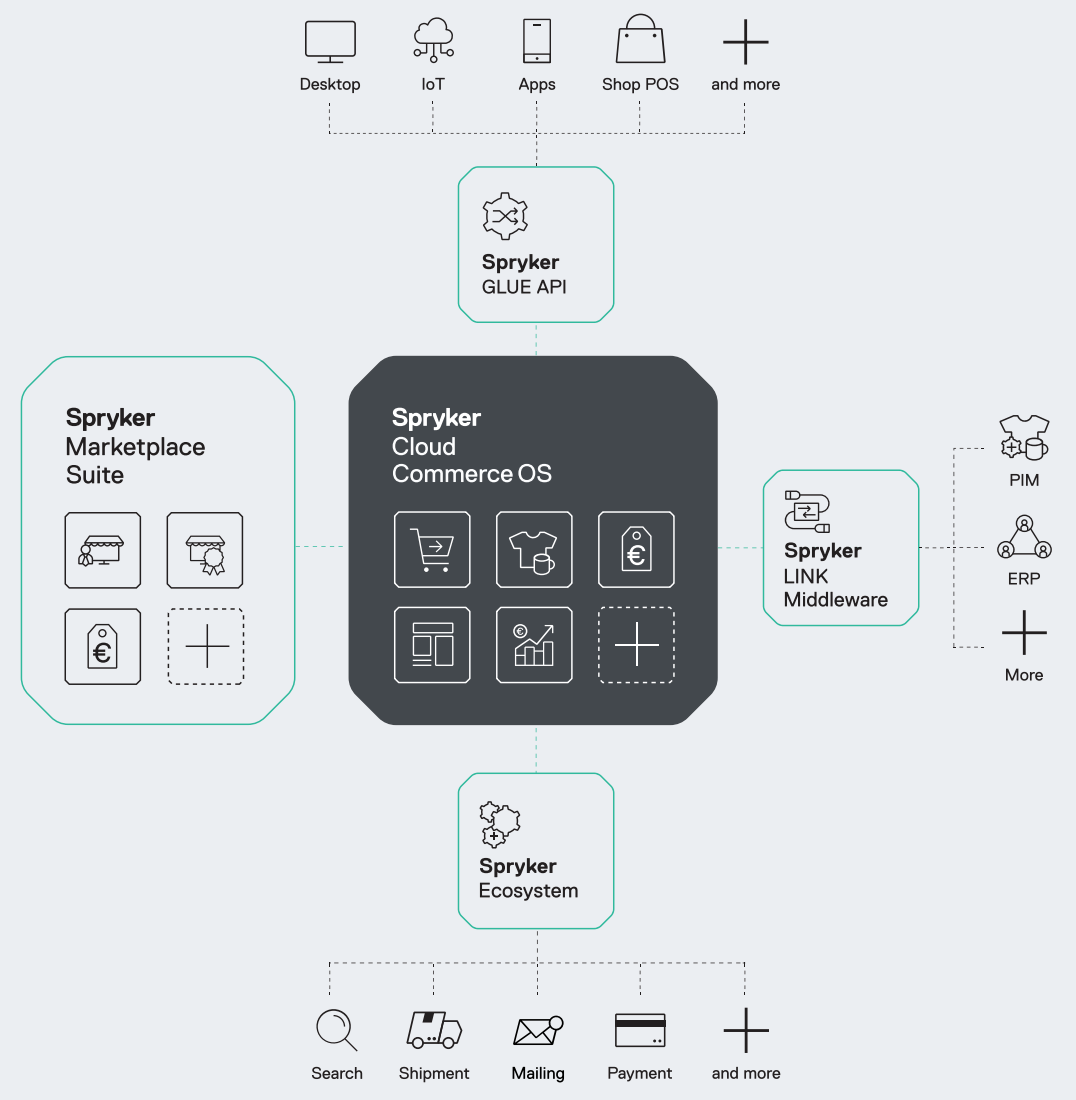
The Merchant Portal
Highlighted FeatureThe Spryker Merchant Portal is the management interface for third-party Merchants and enables them to take care of all administrative tasks in one place. The merchant can register and edit a merchant profile that contains contact details, shop descriptions with logos and banners, and legal information. In the Merchant Portal, merchants can list their products and individual offers for existing products in the marketplace. Also, they can keep track of all incoming orders and manage order statuses for their customers. A dashboard function provides the latest sales reports.
Benefit: Expand your business and save costs by allowing merchants to create and manage their offers.
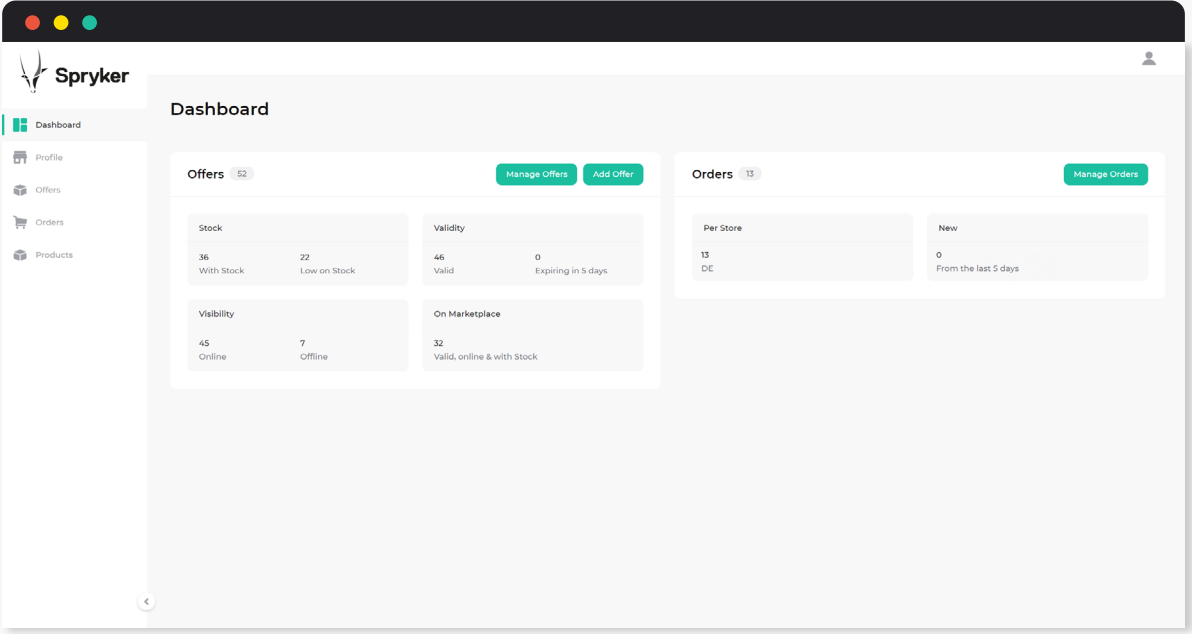
Merchant Products and Offers
Highlighted FeatureMerchants can create their portfolio of products to sell in a marketplace. Additionally, they can set up offers for products listed in the marketplace and define prices, stock availability, and validity dates for their Products and Offers. Each merchant can easily filter, search, and manage their existing offers in the Merchant Portal.
Benefit: Easily expand your product portfolio with low costs and fulfill customer expectations by introducing merchant offers.
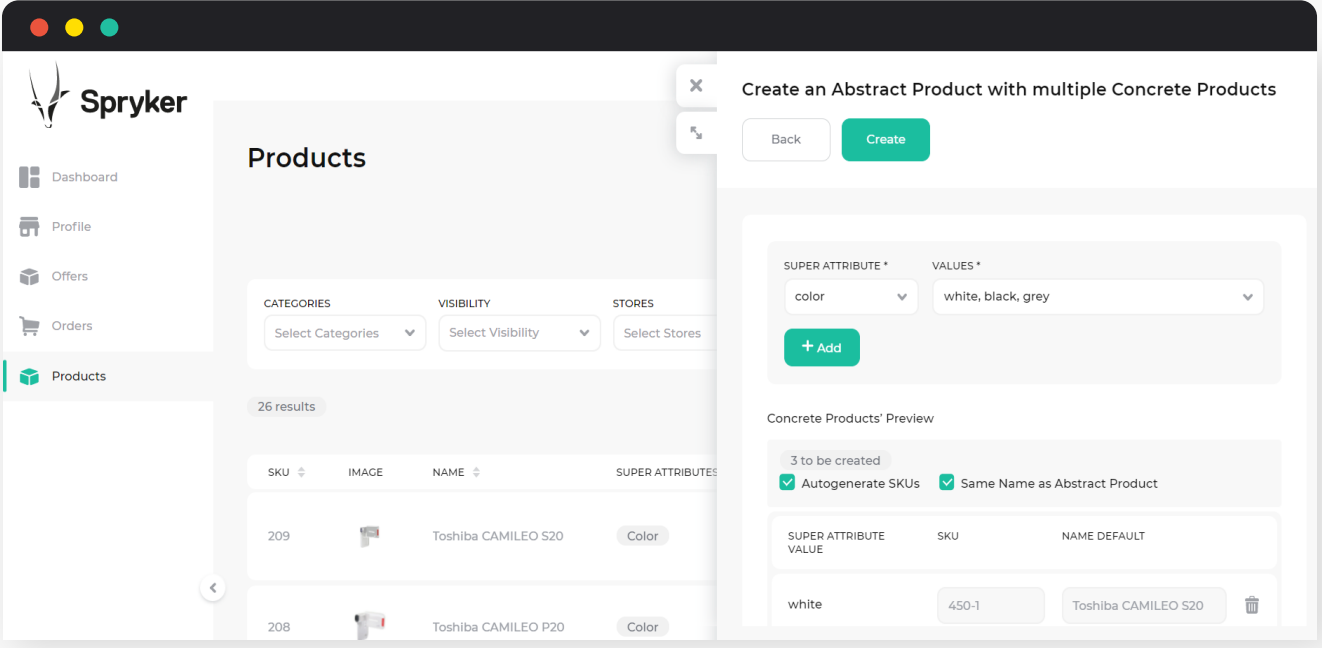
Marketplace Storefront
Highlighted FeatureThe marketplace storefront can be used as a stand-alone or integrated extension to your storefront to create a more seamless shopping experience for your customers.
Incorporate the offers of all your merchants and showcase them uniformly in your marketplace storefront. Allow your customers to select offers from different merchants and add them all to a single cart. While completing an order, your customer can relate all the products and every single shipment to each merchant. Your customers can also browse, search, and filter the offers by merchants. To learn more about a merchant, customers can visit the merchant profile page – where they can find additional information such as the merchant's contact information, ratings, and reviews.
Benefit: Easily expand your product portfolio with low costs and fulfill customer expectations by introducing merchant offers.
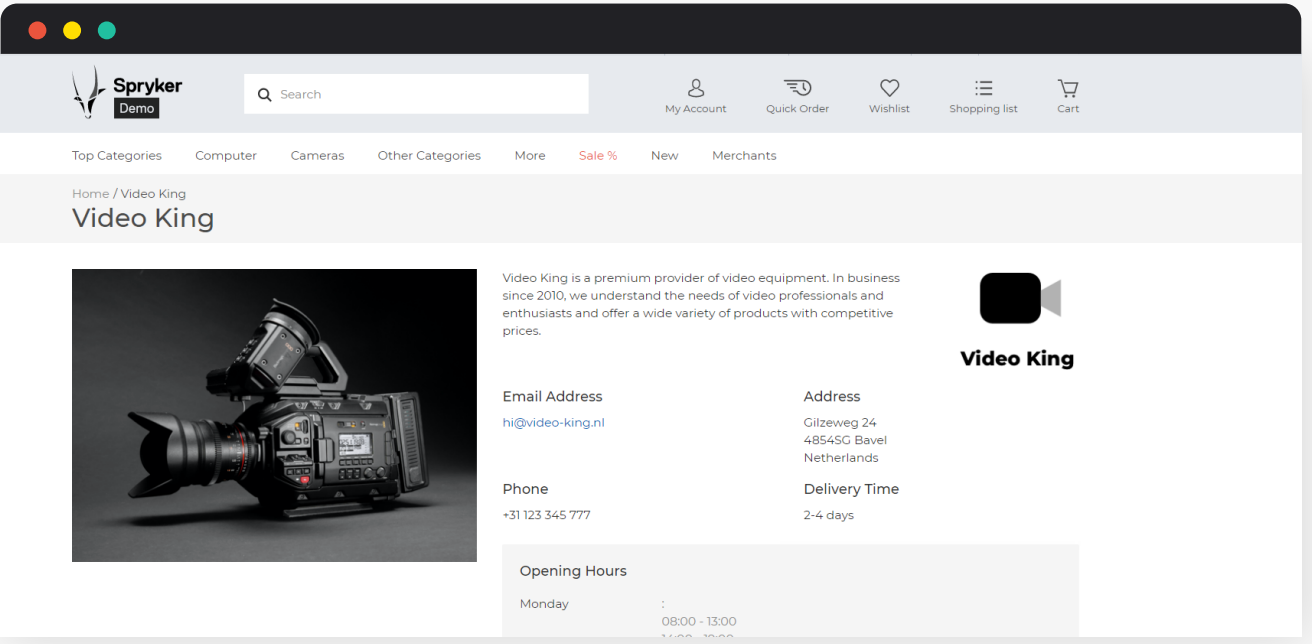
Back Office for Marketplace Operator
Highlighted FeatureThe Back Office functionalities for Marketplace Operators leave you in charge of managing your Marketplace and Merchants. Easily create and manage new Merchants and review their product portfolio. You have the option to approve and decline offers if they don’t follow your shop’s guidelines. Stay informed about all the transactions on your platform by accessing and managing all the Merchant orders.
Benefit: Ensure compliance with your Marketplace guidelines and by managing them effectively within your Back Office.
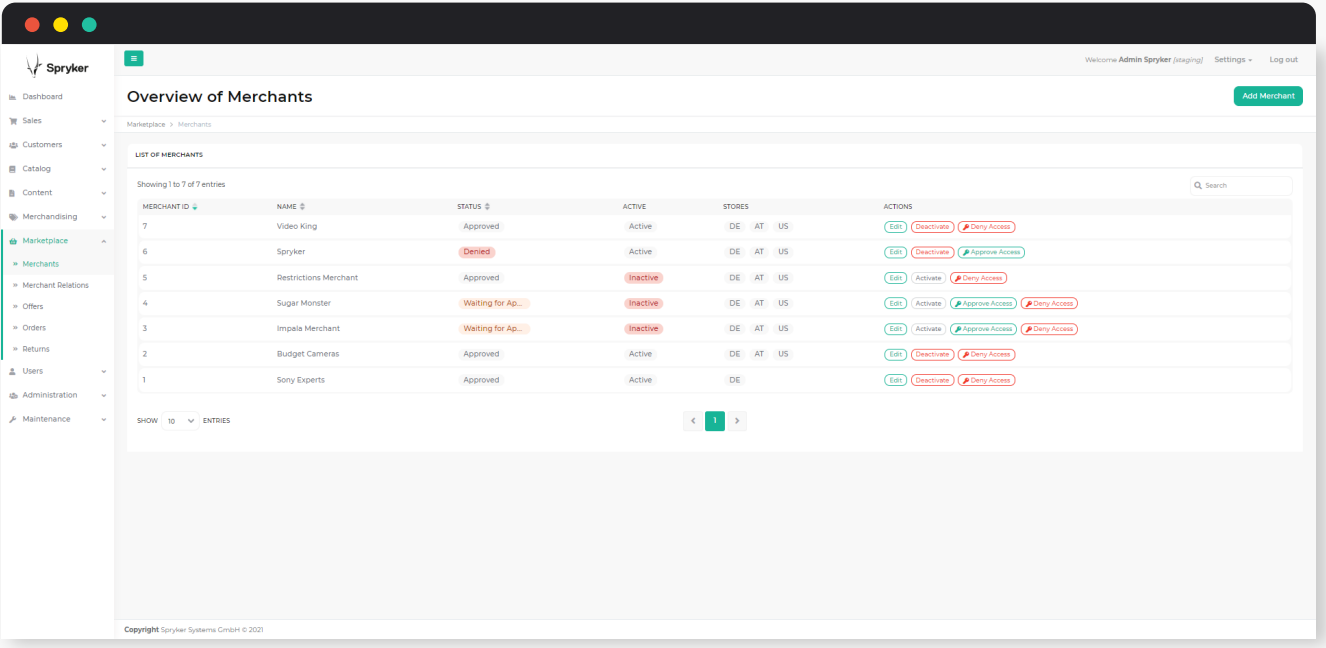
About Spryker
Spryker is the leading global composable commerce platform for enterprises with sophisticated business models to enable growth, innovation, and differentiation. Designed specifically for sophisticated transactional businesses, Spryker’s easy-to-use, headless, API-first model offers a best-of-breed approach that provides businesses the flexibility to adapt, scale, and quickly go to market while facilitating faster time-to-value throughout their digital transformation journey. As a global platform leader for B2B and B2C Enterprise Marketplaces, IoT Commerce, and Unified Commerce, Spryker has empowered 150+ global enterprise customers worldwide and is trusted by brands such as ALDI, Siemens, ZF Friedrichshafen, and Ricoh. Spryker is a privately held technology company headquartered in Berlin and New York backed by world class investors such as TCV, One Peak, Project A, Cherry Ventures, and Maverick Capital. Learn more at spryker.com.
